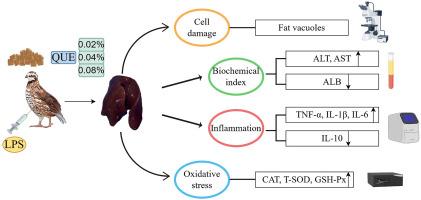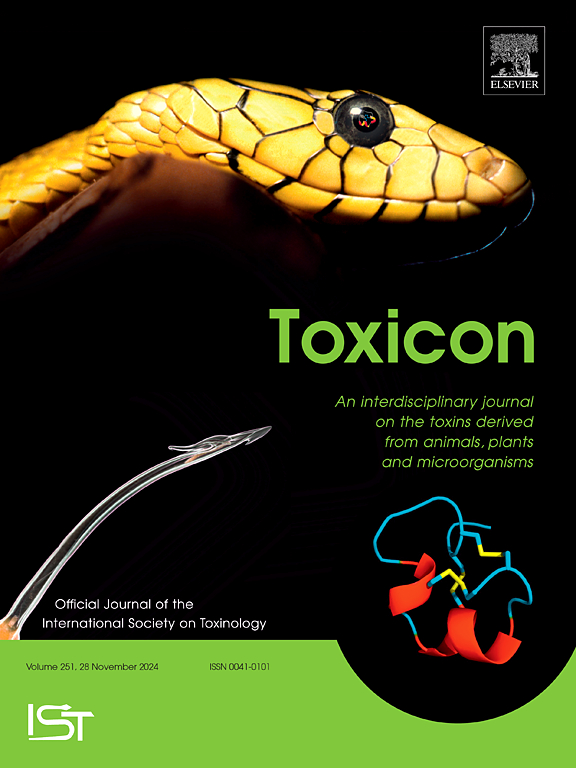槲皮素对lps致鹌鹑肝损伤的保护作用。
IF 2.4
4区 医学
Q2 PHARMACOLOGY & PHARMACY
引用次数: 0
摘要
槲皮素是一种具有抗氧化和抗炎活性的天然类黄酮,有望作为一种饲料添加剂,减少抗生素的使用,提高动物产量和器官健康。本研究旨在研究槲皮素对鹌鹑脂多糖(LPS)所致肝损伤的保护作用,并筛选其最佳饲粮浓度。饲喂在基础饲粮中添加不同浓度槲皮素(0.02%、0.04%和0.08%)的鹌鹑。实验后期通过腹腔注射LPS诱导大鼠肝损伤。结果表明,槲皮素对lps诱导的肝细胞病理改变具有剂量依赖性。显著下调促炎基因的表达,上调抗炎基因的表达。具体而言,饲粮中添加0.04%和0.08%槲皮素可提高肝脏白蛋白含量,增强抗氧化酶过氧化氢酶和谷胱甘肽过氧化物酶的活性。本研究表明槲皮素通过激活抗氧化系统和调节炎症反应来保护鹌鹑肝脏免受lps诱导的损伤。研究结果为槲皮素作为功能性饲料添加剂在鹌鹑生产中的应用提供了理论依据。本文章由计算机程序翻译,如有差异,请以英文原文为准。

Protective effects of quercetin on LPS-induced liver injury in quails
Quercetin, a natural flavonoid with antioxidant and anti-inflammatory activities, shows promise as a feed additive that reduces antibiotic use and enhances animal production and organ health. This study investigated the protective effects of dietary quercetin against lipopolysaccharide (LPS)-induced liver injury in quail and screened for its optimal dietary concentration. Quails were fed a basal diet supplemented with different concentrations of quercetin (0.02 %, 0.04 %, and 0.08 %). Liver injury was then induced via an intraperitoneal LPS injection in the late experimental stage. Results showed that quercetin supplementation alleviated LPS-induced pathological changes in the hepatocytes in a dose-dependent manner. It significantly down-regulated the expression of key pro-inflammatory genes and up-regulated that of anti-inflammatory genes. Specifically, dietary supplementation with 0.04 % and 0.08 % quercetin increased liver albumin content and enhanced the activities of the antioxidant enzymes catalase and glutathione peroxidase. This study demonstrates that quercetin protects the quail liver from LPS-induced injury by activating the antioxidant system and modulating inflammatory responses. These findings provide a theoretical basis for the application of quercetin as a functional feed additive in quail production.
求助全文
通过发布文献求助,成功后即可免费获取论文全文。
去求助
来源期刊

Toxicon
医学-毒理学
CiteScore
4.80
自引率
10.70%
发文量
358
审稿时长
68 days
期刊介绍:
Toxicon has an open access mirror Toxicon: X, sharing the same aims and scope, editorial team, submission system and rigorous peer review. An introductory offer Toxicon: X - full waiver of the Open Access fee.
Toxicon''s "aims and scope" are to publish:
-articles containing the results of original research on problems related to toxins derived from animals, plants and microorganisms
-papers on novel findings related to the chemical, pharmacological, toxicological, and immunological properties of natural toxins
-molecular biological studies of toxins and other genes from poisonous and venomous organisms that advance understanding of the role or function of toxins
-clinical observations on poisoning and envenoming where a new therapeutic principle has been proposed or a decidedly superior clinical result has been obtained.
-material on the use of toxins as tools in studying biological processes and material on subjects related to venom and antivenom problems.
-articles on the translational application of toxins, for example as drugs and insecticides
-epidemiological studies on envenoming or poisoning, so long as they highlight a previously unrecognised medical problem or provide insight into the prevention or medical treatment of envenoming or poisoning. Retrospective surveys of hospital records, especially those lacking species identification, will not be considered for publication. Properly designed prospective community-based surveys are strongly encouraged.
-articles describing well-known activities of venoms, such as antibacterial, anticancer, and analgesic activities of arachnid venoms, without any attempt to define the mechanism of action or purify the active component, will not be considered for publication in Toxicon.
-review articles on problems related to toxinology.
To encourage the exchange of ideas, sections of the journal may be devoted to Short Communications, Letters to the Editor and activities of the affiliated societies.
 求助内容:
求助内容: 应助结果提醒方式:
应助结果提醒方式:


